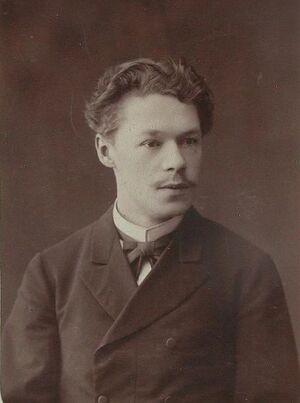Anton Arensky: Difference between revisions
No edit summary |
No edit summary |
||
| (One intermediate revision by the same user not shown) | |||
| Line 1: | Line 1: | ||
{{picture|file= | {{picture|file=Arensky_Anton.jpg|caption='''Anton Arensky''' (1861-1906)}} | ||
Russian composer, conductor, and pianist (b. 30 June/12 July 1861 in Novgorod; d. 12/25 February 1906 at Perkijarvi, near [[Terijoki]], Finland [now [[Zelenogorsk]], Russia]), born '''''Anton Stepanovich Arensky''''' (Антон Степанович Аренский). | Russian composer, conductor, and pianist (b. 30 June/12 July 1861 in Novgorod; d. 12/25 February 1906 at Perkijarvi, near [[Terijoki]], Finland [now [[Zelenogorsk]], Russia]), born '''''Anton Stepanovich Arensky''''' (Антон Степанович Аренский). | ||
In 1882, Arensky graduated from the [[Saint Petersburg]] Conservatory, where he had studied composition under [[Nikolay Rimsky-Korsakov]], and until 1894 he was a professor at the [[Moscow]] Conservatory, where his students included [[Sergei Rachmaninoff]] and Aleksandr Skriabin. From 1895 to 1901, he was director of the Imperial Chapel Choir in [[Saint Petersburg]]. | In 1882, Arensky graduated from the [[Saint Petersburg]] Conservatory, where he had studied composition under [[Nikolay Rimsky-Korsakov]], and until 1894 he was a professor at the [[Moscow]] Conservatory, where his students included [[Sergei Rachmaninoff]] and Aleksandr Skriabin. From 1895 to 1901, he was director of the Imperial Chapel Choir in [[Saint Petersburg]]. | ||
==Dedications== | |||
In 1894, Arensky dedicated his String Quartet No. 2 in A minor, Op. 35, to Tchaikovsky's memory. The second movement uses the melody of ''Legend'' — No. 5 of Tchaikovsky's [[Sixteen Songs for Children]], Op. 54 (1884). Arensky later arranged this movement as a separate piece for string orchestra, entitled ''Variations on a Theme of Tchaikovsky'', Op. 35a. | |||
==Correspondence with Tchaikovsky== | ==Correspondence with Tchaikovsky== | ||
| Line 17: | Line 18: | ||
* '''[[Letter 4471]]''' – 8/20 September 1891, from [[Maydanovo]] | * '''[[Letter 4471]]''' – 8/20 September 1891, from [[Maydanovo]] | ||
4 letters from Arensky to the composer, dating from 1886 to 1891, are preserved in the {{RUS-KLč}} at [[Klin]]. | 4 letters from Arensky to the composer, dating from 1886 to 1891, are preserved in the {{RUS-KLč}} at [[Klin]] (a{{sup|4}}, Nos. 99–102). | ||
==External Links== | ==External Links== | ||
Latest revision as of 10:42, 26 August 2023
Russian composer, conductor, and pianist (b. 30 June/12 July 1861 in Novgorod; d. 12/25 February 1906 at Perkijarvi, near Terijoki, Finland [now Zelenogorsk, Russia]), born Anton Stepanovich Arensky (Антон Степанович Аренский).
In 1882, Arensky graduated from the Saint Petersburg Conservatory, where he had studied composition under Nikolay Rimsky-Korsakov, and until 1894 he was a professor at the Moscow Conservatory, where his students included Sergei Rachmaninoff and Aleksandr Skriabin. From 1895 to 1901, he was director of the Imperial Chapel Choir in Saint Petersburg.
Dedications
In 1894, Arensky dedicated his String Quartet No. 2 in A minor, Op. 35, to Tchaikovsky's memory. The second movement uses the melody of Legend — No. 5 of Tchaikovsky's Sixteen Songs for Children, Op. 54 (1884). Arensky later arranged this movement as a separate piece for string orchestra, entitled Variations on a Theme of Tchaikovsky, Op. 35a.
Correspondence with Tchaikovsky
8 letters from Tchaikovsky to Anton Arensky have survived, dating from 1884 to 1891, of which those highlighted in bold have been translated into English on this website:
- Letter 2455a – late March/early April 1884 (?), from Moscow
- Letter 2775 – 25 September/7 October 1885, from Maydanovo
- Letter 3110 – 24 November/6 December 1886, from Moscow
- Letter 3215 – 2/14 April 1887, from Maydanovo
- Letter 4153 – 20 June/2 July or 21 June/3 July 1890 (?), from Frolovskoye
- Letter 4273a – 21 December 1890/2 January 1891, from Kiev
- Letter 4431 – 7/19 July 1891, from Maydanovo
- Letter 4471 – 8/20 September 1891, from Maydanovo
4 letters from Arensky to the composer, dating from 1886 to 1891, are preserved in the Tchaikovsky State Memorial Musical Museum-Reserve at Klin (a4, Nos. 99–102).

